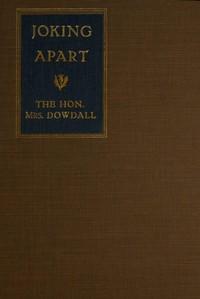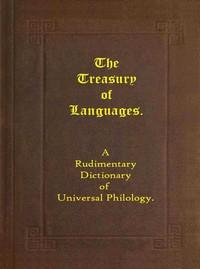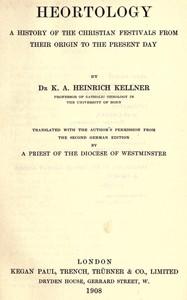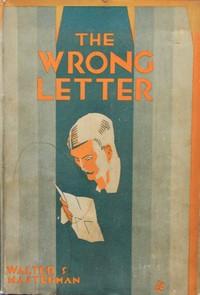Read this ebook for free! No credit card needed, absolutely nothing to pay.
Words: 65046 in 17 pages
This is an ebook sharing website. You can read the uploaded ebooks for free here. No credit cards needed, nothing to pay. If you want to own a digital copy of the ebook, or want to read offline with your favorite ebook-reader, then you can choose to buy and download the ebook.
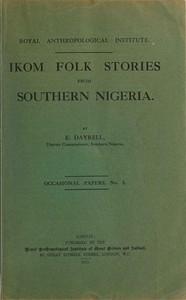

: Ikom folk stories from Southern Nigeria by Dayrell Elphinstone - Tales Nigeria Southern; Folklore Nigeria Southern
ROYAL ANTHROPOLOGICAL INSTITUTE.
IKOM FOLK STORIES FROM SOUTHERN NIGERIA.
BY
E. DAYRELL,
OCCASIONAL PAPERS, No. 3.
LONDON: PUBLISHED BY THE Royal Anthropological Institute of Great Britain and Ireland. 50, GREAT RUSSELL STREET, LONDON, W.C.
PREFACE
It will be observed on perusing some of these stories that in several of them the greater part of the tale has nothing, apparently, to do with the main object, which frequently might be dismissed in a few sentences. But that will not surprise anyone who knows the native well, as he can never come to the point at once, but must always first beat about the bush. For example, a native will come to make a complaint that certain goods belonging to him have been stolen and he wants to have the thief punished. After the usual salutations have been exchanged, he will make his complaint, which when translated by the interpreter will be something like the following: "My father and father catch one man goat and one woman goat. They done born two piccane. One piccane done die and leff one piccane. Them piccane, them leff, born two piccane. My father and father done die and him brother take all them thing; but he be big hunter man and no care them goat too much, so he done dash my father. My father catch one slave man, they call 'im Okon and he good man, so my father dash him them two goat. Okon catch wife and two piccane. One be mammie piccane they call 'im Awa, she fine too much, when she done grow I marry her proper and take her brother Abassi for make my head boy. Last moon I send him Calabar for my canoe with twenty bag kernel and one puncheon palm oil. I tell 'im for factory and bring tobacco and cloth and gin. He done catch them thing and one night he stop for one country, he no know how them call him. Them people come and thief them gin for night time but he no look them man cause he live for sleep, so I make them boy pay for them gin and now I want catch them thief man."
It is noteworthy that when you get over the watershed between the Cross River and the Katsena , and into the Munchi country, ju-ju does not seem to exist in the same way as it does further south. In the year 1909, while I was Political Officer on the Anglo-German Boundary Commission, I marched up through the Munchi country into Northern Nigeria, and back again, being absent from my district altogether about six months. During the whole of that time there was not a single death in any of the Munchi or Domi towns where I stayed. It was so noticeable that even the soldiers and carriers remarked upon the absence of deaths, and could not understand the reason. It may have been that the country was more healthy, and we may have been very fortunate, but the fact remains that where there was no ju-ju there were no deaths, and when we returned to the country of ju-ju deaths were of frequent occurrence.
It is perhaps noteworthy that these people, who are pure cannibals, all file their teeth to a sharp point.
With reference to the eating of rats, it may be remarked that all the natives in the Ikom district eat the bush rat, which is quite different from the house or domestic species, but the Bassankwala people are the only natives the author has met who eat the "common or garden" house rat. The large fruit-eating bats, about which so many native stories are told, are looked upon as a great delicacy, and at Insofan on the Cross River, there is quite a trade done in them, one bat selling for one rod or sixpence in English money. In the evening, just before it gets dark, you can frequently see thousands of these bats flying off, high up in the air, to their favourite feeding places. The way they are obtained for food is simple and may be worth mentioning. On the bank opposite to Insofan there are some very tall trees covered with creepers, in which many thousands of these bats sleep during the day. A few hunters go out with their long Dane guns and station themselves one under each tree. Then when one man has found a thick cluster of bats, he fires into them, and with luck brings down a few.
Immediately the bats hear the gun fired, they desert the trees they are sheltering in, and commence circling around in the air, flying about in a most aimless and erratic sort of way, until, after about ten minutes, they settle on a different tree. Then another hunter fires, and so the game goes on. In connection with these creatures, it is curious to notice the agitation amongst the birds, should one happen to be disturbed in the day time. The same applies to the large eagle owls, who are invariably chased by the smaller birds, whenever they appear while the sun is up, but it is seldom the owl comes out in the day time, and then he takes shelter in some thick covert as soon as possible.
Free books android app tbrJar TBR JAR Read Free books online gutenberg
More posts by @FreeBooks
